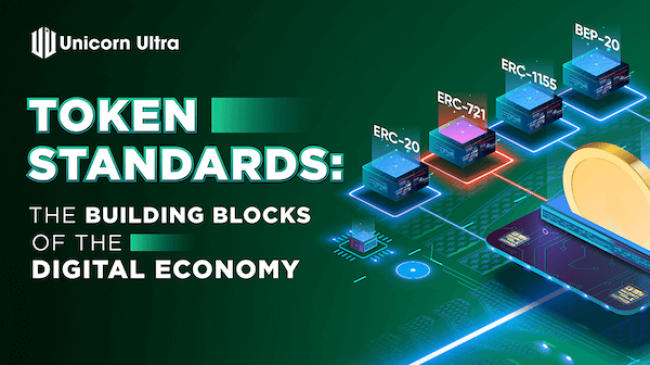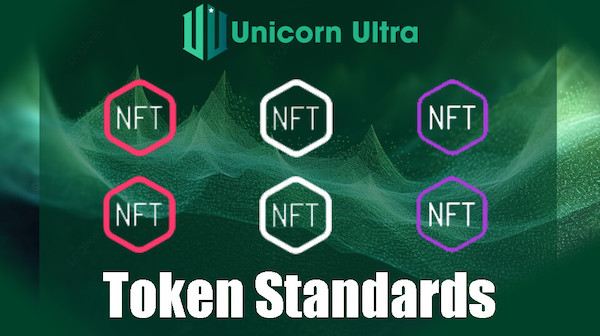Table of Contents
What is Token Standard?
Token standards are a set of rules, conditions, and functions that govern the operation of a cryptocurrency token.

Before delving into token standards, it is helpful to understand the mechanisms of a smart contract standard. Essentially, smart contract standards are a set of rules that a smart contract must adhere to in order to function as intended on the underlying blockchain network.
These standards encompass various application-level specifications, such as token standards, name registries, and library-package formats. Equipped with this array of smart contract standards and clearly defined parameters, individuals with sufficient knowledge can create their own ERC tokens. In essence, these standards empower smart contracts to fulfill their fundamental functions.
Token standards represent a subset of smart contract standards. For blockchains that support smart contracts, token standards serve as guidelines for the creation, issuance, and deployment of new tokens on these platforms.
Currently, Ethereum is the most widely used blockchain for smart contracts, and the prevalent token standards include ERC-20, ERC-721, ERC-777, and ERC-1155.
What is the importance of Token Standards?
Consistency and Interoperability
Token standards ensure consistency and interoperability across various blockchain platforms and applications. They establish a universal framework that allows tokens to function consistently, regardless of the blockchain they operate on. This consistency is vital for widespread adoption and compatibility.
Simplified Token Trading and Usage
Standardized tokens can be easily traded and utilized across different decentralized exchanges (DEXs), wallets, and applications. This interoperability enhances liquidity, making it convenient for users to engage in token transactions and access decentralized services.
Prevention of Unintentional Errors
Token standards help avoid unintended errors or vulnerabilities that may arise when creating custom tokens. By adhering to established standards, developers reduce the risk of coding mistakes and security issues, ensuring the reliability of the tokens.
Common Token Standard

ERC-20 Token Standard
The Ethereum Request for Comment 20 (ERC-20) standard is one of the most widely recognized token standards. It defines a set of rules for fungible tokens on the Ethereum blockchain. ERC-20 tokens are interchangeable and can be used for various purposes, including ICOs, governance tokens, and stablecoins.
ERC-721 Token Standard
The Ethereum Request for Comment 721 (ERC-721) standard is designed for non-fungible tokens (NFTs). NFTs represent unique assets and are used for digital collectibles, art, virtual real estate, and other assets that require individual ownership and distinct characteristics.
ERC-1155 Token Standard
The Ethereum Request for Comment 1155 (ERC-1155) standard offers a hybrid approach, supporting both fungible and non-fungible tokens within a single contract. This flexibility is particularly useful for gaming platforms and applications that require a variety of asset types.
BEP-20 Token Standard
The Binance Smart Chain (BSC) Equivalent to the ERC-20 standard is BEP-20. BEP-20 tokens are compatible with Binance's blockchain network and offer similar functionality as ERC-20 tokens. They have gained popularity within the BSC ecosystem.
Limitations of Token Standards
While token standards provide essential guidelines and interoperability, they are not without limitations. Some challenges include:

- Lack of Customization: Strict adherence to standards may limit the customization of tokens, making it challenging to create unique functionalities.
- Complexity for Developers: Developers may find it complex to create tokens that conform to certain standards, especially when their projects require specific features.
- Potential for Standard Wars: As blockchain ecosystems evolve, competing token standards may emerge, leading to fragmentation and compatibility issues.
Conclusion
In conclusion, token standards are the backbone of the digital asset ecosystem, ensuring consistency, interoperability, and security. Standards like ERC-20, ERC-721, ERC-1155, and BEP-20 have played instrumental roles in shaping the blockchain industry.
While they offer significant advantages, it's essential to recognize their limitations and the ongoing evolution of standards in response to the ever-changing blockchain landscape. Understanding token standards is key to navigating the dynamic world of digital assets and blockchain technology.
Thank you for accompanying us at U2U through the article 'What is Token Standard concept?' Please stay tuned with us for the latest updates.






